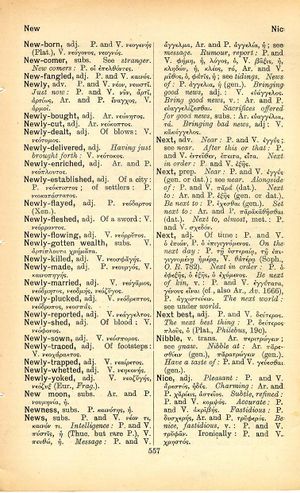next: Difference between revisions
From LSJ
ἰσότης φιλότητα ἀπεργάζεται → equality leads to friendship
mNo edit summary |
m (Woodhouse1 replacement) |
||
| Line 1: | Line 1: | ||
{{Woodhouse1 | {{Woodhouse1 | ||
|Text=[[File:woodhouse_557.jpg|thumb|link={{filepath:woodhouse_557.jpg}}]] | |Text=[[File:woodhouse_557.jpg|thumb|link={{filepath:woodhouse_557.jpg}}]] | ||
===adverb=== | |||
[[near]]: P. and V. [[ἐγγύς]]; see [[near]]. | [[near]]: [[prose|P.]] and [[verse|V.]] [[ἐγγύς]]; see [[near]]. | ||
[[after this]] or [[after that]]: P. and V. [[ἐντεῦθεν]], [[ἔπειτα]], [[εἶτα]]. | [[after this]] or [[after that]]: [[prose|P.]] and [[verse|V.]] [[ἐντεῦθεν]], [[ἔπειτα]], [[εἶτα]]. | ||
[[next in order]]: P. and V. [[ἑξῆς]]. | [[next in order]]: [[prose|P.]] and [[verse|V.]] [[ἑξῆς]]. | ||
===preposition=== | |||
[[near]]: P. and V. [[ἐγγύς]] (gen. or dat.); see [[near]]. | [[near]]: [[prose|P.]] and [[verse|V.]] [[ἐγγύς]] (gen. or dat.); see [[near]]. | ||
[[alongside of]]: P. and V. [[παρά]] (dat.). | [[alongside of]]: [[prose|P.]] and [[verse|V.]] [[παρά]] (dat.). | ||
[[next to]]: Ar. and P. [[ἑξῆς]] (gen. or dat.). | [[next to]]: [[Aristophanes|Ar.]] and [[prose|P.]] [[ἑξῆς]] (gen. or dat.). | ||
[[be next to]]: P. [[ἔχεσθαι]] (gen.). | [[be next to]]: [[prose|P.]] [[ἔχεσθαι]] (gen.). | ||
[[set next to]]: Ar. and P. [[παρακαθῆσθαι]] (dat.). | [[set next to]]: [[Aristophanes|Ar.]] and [[prose|P.]] [[παρακαθῆσθαι]] (dat.). | ||
[[next to]], [[almost]], met.: P. and V. [[σχεδόν]]. | [[next to]], [[almost]], met.: [[prose|P.]] and [[verse|V.]] [[σχεδόν]]. | ||
===adjective=== | |||
Of time: P. and V. ὁ ἐπιών, P. ὁ ἐπιγιγνόμενος. | Of time: [[prose|P.]] and [[verse|V.]] [[ὁ ἐπιών]], [[prose|P.]] [[ὁ ἐπιγιγνόμενος]]. | ||
[[on the next day]]: P. τῇ ὑστεραίᾳ, τῇ ἐπιγιγνομένῃ ἡμέρᾳ, V. θἀτέρᾳ (Soph., '' | [[on the next day]]: [[prose|P.]] [[τῇ ὑστεραίᾳ]], [[τῇ ἐπιγιγνομένῃ ἡμέρᾳ]], [[verse|V.]] [[θἀτέρᾳ]]; ([[Sophocles|Soph.]], ''[[Oedipus Rex]]'' 782). | ||
[[next in order]]: P. ὁ. [[ἐφεξῆς]], | [[next in order]]: [[prose|P.]] [[ὁ]]. [[ἐφεξῆς]], [[ὁ ἑξῆς]], [[ὁ ἐχόμενος]]. | ||
[[be next of kin]], v.: P. and V. ἐγγύτατα, γένους εἶναι (cf., also Ar., Av. 1666), P. [[ἀγχιστεύειν]]. | [[be next of kin]], v.: [[prose|P.]] and [[verse|V.]] [[ἐγγύτατα]], [[γένους εἶναι]] (cf., also [[Aristophanes|Ar.]], Av. 1666), [[prose|P.]] [[ἀγχιστεύειν]]. | ||
[[the next world]]: see under [[world]]. | [[the next world]]: see under [[world]]. | ||
}} | }} | ||
Revision as of 09:15, 20 May 2020
English > Greek (Woodhouse)
adverb
near: P. and V. ἐγγύς; see near.
after this or after that: P. and V. ἐντεῦθεν, ἔπειτα, εἶτα.
next in order: P. and V. ἑξῆς.
preposition
near: P. and V. ἐγγύς (gen. or dat.); see near.
alongside of: P. and V. παρά (dat.).
next to: Ar. and P. ἑξῆς (gen. or dat.).
be next to: P. ἔχεσθαι (gen.).
set next to: Ar. and P. παρακαθῆσθαι (dat.).
next to, almost, met.: P. and V. σχεδόν.
adjective
Of time: P. and V. ὁ ἐπιών, P. ὁ ἐπιγιγνόμενος.
on the next day: P. τῇ ὑστεραίᾳ, τῇ ἐπιγιγνομένῃ ἡμέρᾳ, V. θἀτέρᾳ; (Soph., Oedipus Rex 782).
next in order: P. ὁ. ἐφεξῆς, ὁ ἑξῆς, ὁ ἐχόμενος.
be next of kin, v.: P. and V. ἐγγύτατα, γένους εἶναι (cf., also Ar., Av. 1666), P. ἀγχιστεύειν.
the next world: see under world.

